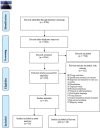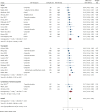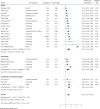The association between socioeconomic disadvantage and children's working memory abilities: A systematic review and meta-analysis
- PMID: 34855871
- PMCID: PMC8639069
- DOI: 10.1371/journal.pone.0260788
The association between socioeconomic disadvantage and children's working memory abilities: A systematic review and meta-analysis
Abstract
Background and objective: Working memory is an essential cognitive skill for storing and processing limited amounts of information over short time periods. Researchers disagree about the extent to which socioeconomic position affects children's working memory, yet no study has systematically synthesised the literature regarding this topic. The current review therefore aimed to investigate the relationship between socioeconomic position and working memory in children, regarding both the magnitude and the variability of the association.
Methods: The review protocol was registered on PROSPERO and the PRISMA checklist was followed. Embase, Psycinfo and MEDLINE were comprehensively searched via Ovid from database inception until 3rd June 2021. Studies were screened by two reviewers at all stages. Studies were eligible if they included typically developing children aged 0-18 years old, with a quantitative association reported between any indicator of socioeconomic position and children's working memory task performance. Studies were synthesised using two data-synthesis methods: random effects meta-analyses and a Harvest plot.
Key findings: The systematic review included 64 eligible studies with 37,737 individual children (aged 2 months to 18 years). Meta-analyses of 36 of these studies indicated that socioeconomic disadvantage was associated with significantly lower scores working memory measures; a finding that held across different working memory tasks, including those that predominantly tap into storage (d = 0.45; 95% CI 0.27 to 0.62) as well as those that require processing of information (d = 0.52; 0.31 to 0.72). A Harvest plot of 28 studies ineligible for meta-analyses further confirmed these findings. Finally, meta-regression analyses revealed that the association between socioeconomic position and working memory was not moderated by task modality, risk of bias, socioeconomic indicator, mean age in years, or the type of effect size.
Conclusion: This is the first systematic review to investigate the association between socioeconomic position and working memory in children. Socioeconomic disadvantage was associated with lower working memory ability in children, and that this association was similar across different working memory tasks. Given the strong association between working memory, learning, and academic attainment, there is a clear need to share these findings with practitioners working with children, and investigate ways to support children with difficulties in working memory.
Conflict of interest statement
The authors have declared that no competing interests exist.
Figures







References
-
- Baddeley A. Working memory. Curr Biol. 2010. - PubMed
-
- Anderson P. Assessment and Development of Executive Function (EF) During Childhood. Child Neuropsychol [Internet]. 2002;8(2):71–82. Available from: http://www.tandfonline.com/doi/abs/10.1076/chin.8.2.71.8724 - DOI - PubMed
-
- Gathercole SE, Durling E, Evans M, Jeffcock S, Stone S. Working memory abilities and children’s performance in laboratory analogues of classroom activities. Appl Cogn Psychol [Internet]. 2008. Dec 1 [cited 2021 Jan 4];22(8):1019–37. Available from: http://doi.wiley.com/10.1002/acp.1407. - DOI
Publication types
MeSH terms
Grants and funding
LinkOut - more resources
Full Text Sources
Medical
Miscellaneous

